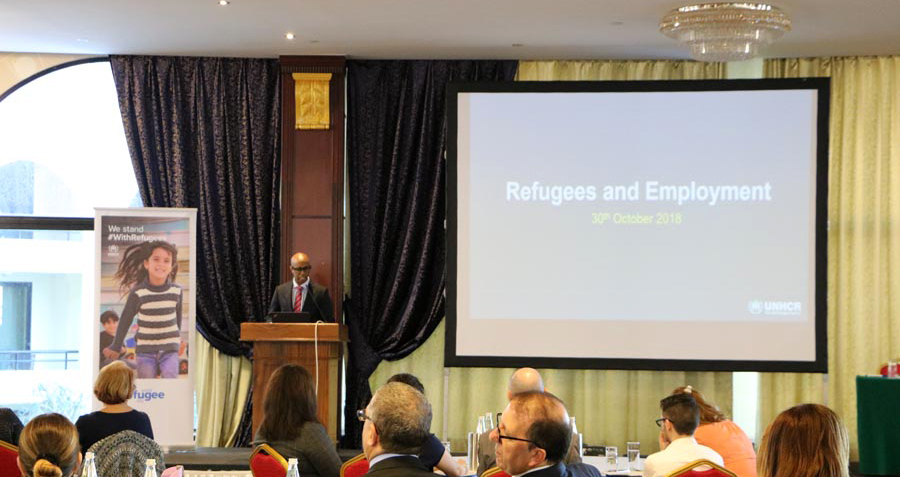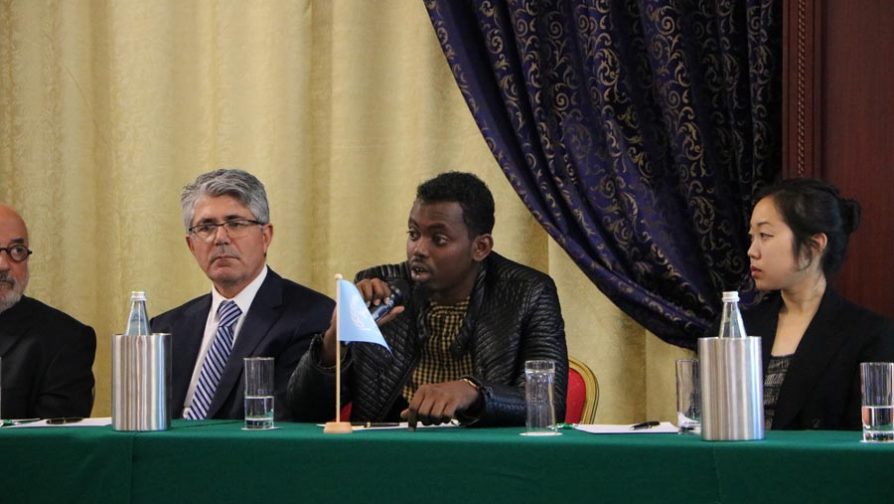A UNHCR conference on Refugees & Employment engaged participants in meaningful discussion on various challenges facing refugees in the employment sector, as well as ways in which they can be overcome. Multiple stakeholders were present, giving their perspectives on the main issues and working together towards tangible solutions.

Kahin Ismail, UNHCR representative to Malta, opening speech. © UNHCR Malta
© A UNHCR conference on Refugees & Employment engaged participants in meaningful discussion on various challenges facing refugees in the employment sector, as well as ways in which they can be overcome. Multiple stakeholders were present, giving their perspectives on the main issues and working together towards tangible solutions.
On Tuesday 30th October, UNHCR Malta organised a half-day conference for employers, government and non-government employment agencies and refugee and migrant communities. The aim was to identify ways to enhance opportunities, facilitate the process for employers to recruit refugees and consequently improve refugees’ access to the labour market.
The conference was opened by Mr. Kahin Ismail, UNHCR representative to Malta, who outlined the central idea behind UNHCR’s employment initiative:
“Employment is in fact one of the most important factors of integration. Having a gainful job, with all the rights and entitlements associated with it, is an important marker for self-sufficiency, harnessing the economic potential of refugees and creating a win-win situation.”
Hon. Helena Dalli, Minister for EU Affairs and Equality, addressed the audience with a welcome speech, emphasising that employment of refugees is not only helpful, but a beneficial step towards achieving a more integrated society. Hon. Dalli also spoke of the Government’s introduction of the National Integration Strategy and Action Plan, which will provide courses in Maltese, English and cultural orientation.
The conference was a culmination of a series of outreach focus group discussions with key stakeholders organised during the last few months by UNHCR Malta, with the support of JobsPlus (the government agency facilitating access to the labour market), and the NGOs African Media Association and Jesuit Refugee Service Malta (JRS). A summary of these activities was presented by Sarah Farrugia of UNHCR. Throughout the year, Farrugia explained, employers, employees and other stakeholders were asked about opportunities and challenges in the labour market.
Among the responses, some of the main challenges identified were a lack of knowledge of the correct procedures to apply for a work permit, urgent need for language and cultural orientation courses, recognition of certificates, and problems to open bank accounts. Positive experiences were also shared, such as the flexibility of employers to adapt to different cultures and the promotion of integration in some workplaces.
Next, Ylenia Vella, Unit Manager of the Jobseekers’ Advisory Services at Jobsplus explained employment licences and Employment Advisory Services in Malta. Short courses, traineeships and ‘work exposures’ are some of the pathways available to all refugees and migrants, including failed asylum seekers.
Ellen Lee, of UNHCR Livelihoods in Geneva, then gave a presentation outlining a 10-point multi-stakeholder action plan for employers, refugees, governments and civil society, with international examples of good practices in refugee employment.
The next part of the conference was a panel discussion. The panel consisted of Joseph Farrugia, Director General of the Malta Employers’ Association; Denis Gatt, of BD International Group, Rabia Haddud, of Libico (Libyan community organisation), Abdishakur Mohammed, who is a Somali Refugee Focal Point in Gozo; Ylenia Vella, from Jobsplus; and Ellen Lee, of UNHCR Livelihoods.

Abdi Shakur from Somalia, who is a refugee focal point living in Gozo, talks about difficulty gaining skills and education, as well as discrimination at work, as some of the barriers faced by refugees in Malta and Gozo. © UNHCR Malta
Moderated by Mireille Sant of UNHCR, the panel touched on a number of topics from both employer and employee perspectives. Both Abdishakur Mohammed and Rabia Haddud, members of the refugee community in Malta, said that refugees have a strong desire to work. Yet, some obstacles can prevent them from gaining and maintaining stable employment, including lack of language knowledge and limited financial support for refugees who want to pursue training or education to improve their job skills.
From the employers’ perspective, Mr. Gatt of BD International said that his organisation employs a number of refugees and this has been a positive experience despite some challenges. His recommendation was to provide refugees and migrants with more ‘work orientation’ courses so that they can familiarise themselves with work culture in Malta.
Speaking of the variety of skills refugees can offer the local labour market, Mr. Farrugia, Director of Malta Employers’ Association, reminded the audience that refugees should always be considered as job candidates, and ‘not only because there is an economic boom’ in Malta. Mr. Farrugia also stated that from an employer’s perspective, the system should provide more incentives and facilitate the process of employing refugees to make recruitment easier.
During the final part of the conference, participants were divided into groups to discuss the main issues, and to propose solutions to the most pressing concerns. Each group contained a mix of stakeholders, and this allowed government and non-government representatives, and refugee community members to engage in dialogue. At the end, each group reported back to UNHCR with its recommendations and main discussion points.
UNHCR Malta would like to thank all the refugee communities, NGOs, employers, unions, and government departments for attending and contributing to this important discussion.
A report collating suggestions formulated during the conference will be published in 2019.
UNHCR Malta looks forward to continuing to engage with stakeholders on this topic and facilitate better working conditions and opportunities for the refugee community in Malta and Gozo.
***
Share on Facebook Share on Twitter